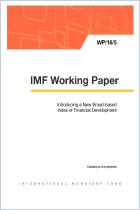加入 getAbstract 阅读摘要

加入 getAbstract 阅读摘要
Sami Ben Naceur and RuiXin Zhang
Financial Development, Inequality and Poverty: Some International Evidence
IMF, 2016
看看什么内容?
Does a rising tide lift all boats? Not always, according to this study on finance and inequality.
Recommendation
In theory, the principal purpose of the financial sector is to allocate capital efficiently. So it would seem intuitive that a bigger financial sector would allocate capital better and support more growth. Studies have tended to bolster this idea, but in such a heterogeneous area as finance, it is reasonable to wonder if all activities are equally useful to society. In this innovative research, economists Sami Ben Naceur and RuiXin Zhang gauge financial development’s impacts on poverty and inequity. getAbstract suggests this scholarly text to economists and policy makers.
Summary
About the Authors
Sami Ben Naceur is an economist at the International Monetary Fund, where RuiXin Zhang was an intern.




















Comment on this summary